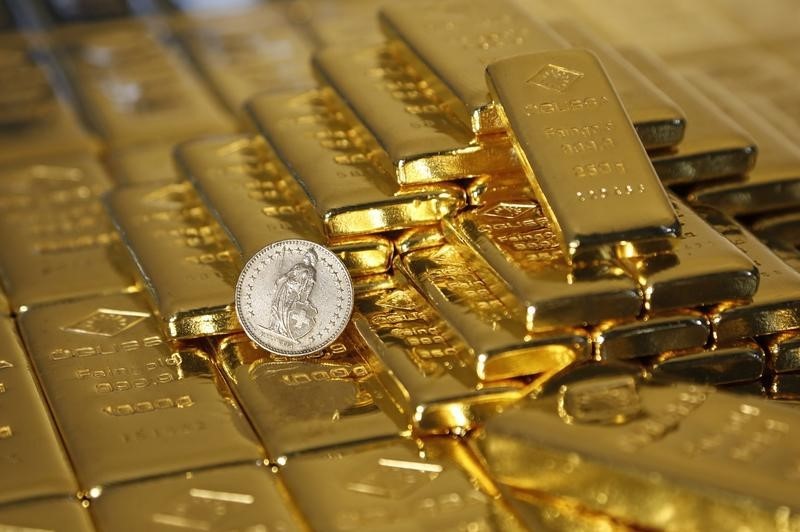(Bloomberg View) -- Blockchain technology, which has already been adopted by gold traders, is starting to show the potential to transform other sectors of the global physical commodities markets.
While it wouldn't necessarily boost commodity prices, the innovation could offer a secure means of exchange of raw materials, open up channels of trade among buyers and sellers that had until now have been perceived as credit risks, and provide more transparency and liquidity to a market that has slowly lost favor among financial institutions.
The technology provides a way of accounting for financial transactions. It was developed as a means of addressing the vulnerability of stored data on exchange of assets. Many associate blockchain with bitcoin. The cryptocurrency has undergone a meteoric price increase this year, up more than 17-fold. Future contracts began trading on Cboe and CME Group (NASDAQ:CME) this month. By Dec. 18, the January contract had soared to over $20,000.
The mainstream adoption of bitcoin is becoming a reality despite skeptics who compare the boom to the 1636 tulip mania. It is unclear whether the crypto-currency serves more as a medium of exchange or a store of value. Another uncertainty is the longevity of the currency, which has many competitors. There are 4,543 cryptocoins with a $567.7 billion market capitalization, according to Cryptocoins Charts. Yet, no matter how many cryptocurrencies succeed or fail, the blockchain technology underlying digital assets is likely to remain and could make commodity trading more secure.
That has already begun to happen with gold, the most liquid commodity traded. As of Nov. 1, you can own physical gold as a digital asset in a digital wallet and transfer that holding to any other wallet on the network. Although gold has multiple tradable products (spot, futures and options, ETPs, indices, physical), blockchain accomplishes what none of the other offerings do -- the ability to bring together all market participants (miners, refiners, wholesale traders, financial institutions, investors and traders and the retail sector).
The Royal Mint, along with the Chicago Mercantile Exchange, established Royal Mint Gold blockchain, a digital asset token to represent physical ownership of gold held in the vault at the Mint in South Wales. Earlier this month, Euroclear and Paxos announced that a group including Société Générale (PA:SOGN), Citi and Scotiabank had completed the first pilot of the blockchain-based gold trading platform developed by Euroclear. And Canada's GoldMoney announced a blockchain product providing clients the ability to trade gold in cryptocurrencies.
Before blockchain, transactions were recorded in an accounting ledger and eventually as entries in a spreadsheet or database stored in computer systems. This could be risky because it isn't always secure. Data can be out of date, tampered with or deleted. Digitally distributed ledgers address this concern. Rather than storing data on a server or database, blocks exist on multiple computers and networks in different locations. Should a change come about in the chain, it will immediately and simultaneously be reflected in every copy.
The advantage is that the duplication of digitally distributed ledgers provides a safety mechanism. Cryptographic proofs lock in the transaction order chain in perpetuity, eliminating any disputes over the sequence of events. The blockchain is verified and validated by the high degree of visibility of every transaction, ensuring consensus. With no sole, central authority, everyone in the chain is a manager of equal stature.
The physical commodities markets have often been laggards when it comes to innovation and cutting-edge technology. That's because they are among the least regulated. Commodities have been able to avoid much of the increasing regulatory scrutiny of financial markets because of the vast number of unregulated geographic areas where they are produced, stored and shipped.
Commodity traders know that a typical metals shipment is not just from mine to smelter or refiner to purchaser; rather, it can involve ships, trains, warehouses, and factories along the way. And even when that shipment sits in on a barge or vessel for a month or in a factory for a year, its ownership can change multiple times. The same would apply to barrels of oil or bags of coffee.
Today, despite the Trump administration's efforts to curb financial regulation, global financial markets are contending with an expanding regulatory framework. The commodities markets are far from immune as regulatory bodies aim to scrutinize participants and enforce transparency and stability. The quality of the supply chain of raw materials is being held to higher standards, and requires a greater transparency of the provenance and traceability of shipments.
Blockchain could help commodity traders transcend conventional market barriers. It also ensures timely settlement, expedites capital allocation and provides proof of collateral.
Its use by gold markets paves the way for increased transparency in physical commodities. That should be just the beginning of a broader adoption of ledger technology that will transform the commodity sector, including other precious and industrial metals, energies, grains and softs.
This column does not necessarily reflect the opinion of the editorial board or Bloomberg LP and its owners.
Shelley Goldberg is an investment adviser and environmental sustainability consultant. She has worked as a commodities strategist for Brevan Howard Asset Management and Roubini Global Economics.
